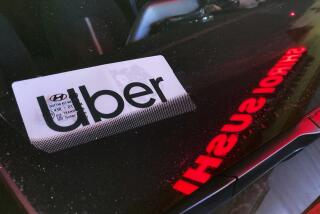Cruise passengers: Beware the port-of-call sales spiel
It used to be routine. Before a passenger ship’s arrival at a Caribbean island, the cruise director in a lecture would recommend places to shop, dine or buy souvenirs.
For his referrals, an enterprising cruise director might expect to be rewarded with merchandise or a free meal from the merchants.
Now the payoffs are higher -- not to the cruise director but to a couple of South Florida promotion companies and their employees who handle shopping lectures and merchandise advertisements on many major cruise lines.
Through live presentations, 24/7 in-cabin TV and printed ads, they heavily promote merchant clients and their wares. And it’s apparently a winning situation for the cruise lines, promotion companies and the merchants. What do passengers get? A conditional 30-day guarantee by the promoters for repair or replacement of unsatisfactory items purchased. And possibly the mistaken impression that the lecturers are part of the crew and giving impartial recommendations.
Passengers often aren’t told by lecturers that they’re paid to plug certain port merchants. And they may get the impression that the speaker is a crew member and that the merchants mentioned have been scrutinized by the cruise line. After witnessing more than a dozen shopping lectures, I’ve yet to hear one say he or she is a promotion company employee and not a crew member.
Here’s how it works: The promoters -- Panoff Publishing Inc. of Fort Lauderdale, Fla., and Onboard Media Inc. of Miami Beach -- pay cruise lines to provide a cabin and lecture platform for their employees. For onboard print and TV advertising privileges, the promotion companies are usually paid a flat fee and get a percentage of sales from their store clients.
Panoff Publishing, or PPI Group, operates a shopping guide and/or customized programs on Carnival, Holland America, P&O Cruises, Costa Cruises, Sea Dream Yacht Club, Windstar and Regent Seven Seas (formerly Radisson) cruise lines. Onboard runs comparable niche programs on Royal Caribbean, Celebrity, Crystal and Disney.
Norwegian Cruise Line, says spokeswoman Susan Robison, uses its own personnel to promote and advertise onshore shops and charges merchants a flat fee plus added fees tied to sales.
For the most part, the operations and merchandise guarantees are similar on most cruise lines.
Read the fine-print guarantee box behind store ads and you’ll learn that participating merchants have paid an advertising fee. Also, the promotion companies -- not the merchants -- handle customer claims and complaints relating to the guarantee.
During the last 36 months, the Better Business Bureau for Southeast Florida and the Caribbean has had eight complaints on Onboard Media, one of which has not been answered, according to Dina Christian, a BBB representative. On a scale of A-plus to F, the bureau rates Onboard a D, she said.
Onboard Media officials declined to answer questions about its operations.
BBB received five complaints against PPI in the same period. All were satisfactorily resolved, earning the company an A-minus rating, she said.
Mitchell Pizik, PPI’s senior vice president of sales and marketing, says, “We get maybe 10 to 12 calls a month from passengers. . . . Maybe half pertain to the 30-day merchandise guarantee. Could be that it’s just a question or that a stone fell out of a piece of jewelry and needs to be replaced. In the latter case, we’ll act as a liaison . . . in arranging for a stone to be reinstalled. When you consider cruise ships carry millions of passengers, hearing from some daily isn’t unusual.”
Bottom line: Before you buy, read and make sure you fully understand the 30-day merchandise guarantee. It does not provide for a refund if you have second thoughts about the item you bought. And most important, check with the store manager to learn the shop’s return and refund policy.
travel@latimes.com
More to Read
Sign up for The Wild
We’ll help you find the best places to hike, bike and run, as well as the perfect silent spots for meditation and yoga.
You may occasionally receive promotional content from the Los Angeles Times.






